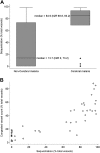Sequestration and microvascular congestion are associated with coma in human cerebral malaria
- PMID: 22207648
- PMCID: PMC3266137
- DOI: 10.1093/infdis/jir812
Sequestration and microvascular congestion are associated with coma in human cerebral malaria
Erratum in
- J Infect Dis. 2012 Nov;206(9):1483
Abstract
The pathogenesis of coma in severe Plasmodium falciparum malaria remains poorly understood. Obstruction of the brain microvasculature because of sequestration of parasitized red blood cells (pRBCs) represents one mechanism that could contribute to coma in cerebral malaria. Quantitative postmortem microscopy of brain sections from Vietnamese adults dying of malaria confirmed that sequestration in the cerebral microvasculature was significantly higher in patients with cerebral malaria (CM; n = 21) than in patients with non-CM (n = 23). Sequestration of pRBCs and CM was also significantly associated with increased microvascular congestion by infected and uninfected erythrocytes. Clinicopathological correlation showed that sequestration and congestion were significantly associated with deeper levels of premortem coma and shorter time to death. Microvascular congestion and sequestration were highly correlated as microscopic findings but were independent predictors of a clinical diagnosis of CM. Increased microvascular congestion accompanies coma in CM, associated with parasite sequestration in the cerebral microvasculature.
Figures


References
-
- Severe falciparum malaria. World Health Organization, Communicable Diseases Cluster. Trans R Soc Trop Med Hyg. 2000;94(Suppl 1):S1–90. - PubMed
-
- Newton CR, Taylor TE, Whitten RO. Pathophysiology of fatal falciparum malaria in African children. Am J Trop Med Hyg. 1998;58:673–83. - PubMed
-
- Lengeler C. Insecticide-treated bed nets and curtains for preventing malaria. Cochrane Database Syst Rev. 2004;(2) CD000363. - PubMed
Publication types
MeSH terms
Grants and funding
LinkOut - more resources
Full Text Sources
Medical

